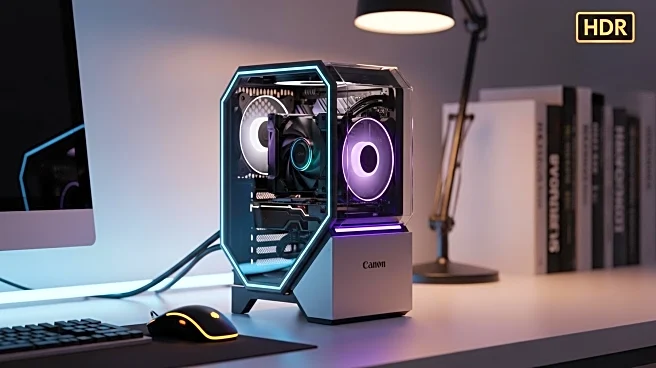What's Happening?
The GMKtec M5 Plus mini PC, powered by AMD's Ryzen 7 5825U processor, is now available on Amazon at a discounted price of $319, down from its original price of $400. This mini PC is equipped with an 8-core, 16-thread processor capable of turbo boosting up to 4.5GHz, offering significant performance improvements over previous generations. It includes 32GB of DDR4 RAM, expandable up to 64GB, and a 1TB PCIe 3.0 SSD for storage. The device supports dual NIC LAN ports for 2.5Gbps Ethernet speeds, WiFi 6E, and Bluetooth 5.2, ensuring robust connectivity. Graphics are handled by an AMD Radeon Graphics 8-core processor, supporting medium settings for gaming and 4K video playback across three monitors.
Why It's Important?
The GMKtec M5 Plus mini PC represents a significant value proposition for consumers seeking high-performance computing without the premium price tag associated with brands like Apple. Its affordability and robust specifications make it an attractive option for gamers, video editors, and office users who require reliable performance. The inclusion of advanced networking capabilities and expandable memory options further enhances its appeal, potentially increasing AMD's market share in the budget computing segment. This development underscores AMD's strategy to compete aggressively in the consumer electronics market by offering cost-effective solutions.
What's Next?
As the GMKtec M5 Plus continues to attract attention, AMD may see increased demand for its Ryzen processors, potentially leading to further innovations and product releases in the mini PC market. Consumers are likely to benefit from competitive pricing and enhanced performance options, driving broader adoption of AMD technology. Additionally, the success of this product could prompt other manufacturers to explore similar offerings, intensifying competition in the affordable computing space.
Beyond the Headlines
The availability of high-performance computing at a lower cost could democratize access to technology, enabling more individuals and small businesses to leverage powerful computing resources. This shift may lead to increased productivity and innovation across various sectors, as more users can afford to engage with demanding applications and tasks. Furthermore, the environmental impact of producing smaller, more efficient devices could contribute to sustainability efforts within the tech industry.










